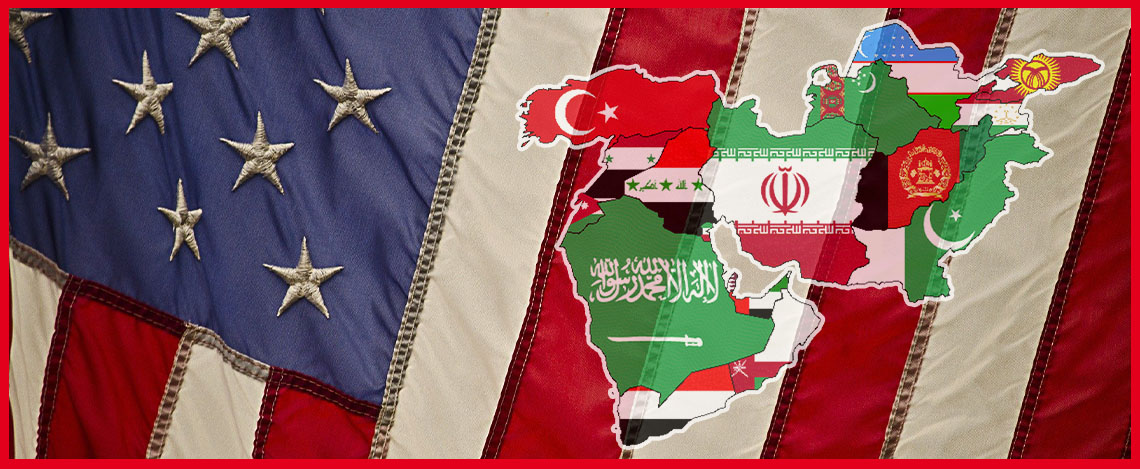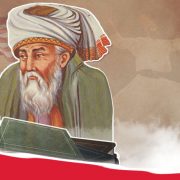Introduction
Imperialistic and ideological roots lie at the heart of the pan-European universal rhetoric in that it justifies and sustains the United States’ policies as the world’s superpower. In a similar vein, such rhetoric justifies the actions of the NATO alliance, the U.K., and mainstream َWestern media as they intervene to dominate the scene in the Middle East, which Orientalists refer to as the “periphery countries”.
This situation seems extremely dangerous because the US, being the New Rome, is reproducing a fixed binary rhetoric that does not accept the opposite other: the struggle between good and evil; between those who follow European universal system, and those who oppose it. Therefore, Eurocentrism produces fixed values of peace, war, free markets, and the new global order. As for their part, universities have played a central role in promoting Western-centrism, both in form and substance.
The Western rhetoric meant here is one which takes root in Western universal values being adopted by all contemporary states, especially those considered as part of the periphery. In this sense, the periphery’s involvement in the European universal rhetoric becomes a form of civilisational assimilation, including the Reaganian neoliberal policies up until the current Trumpian era, which so far represents the darkest manifestation of radical European universalism, Islamophobia and anti-immigrantion. Other representative cases would be Boris Johnson’s leadership in the UK, in addition to all conservative European leaders, who view with suspicion and ‘identitarian’ Orientalism all immigrants from beyond the Mediterranean and elsewhere, especially those coming from the Middles East and Muslim countries.
What has American democracy brought to the Middle East ‒ assuming that it is based on the principles of justice, equality and freedom as enshrined by the Founding Fathers ‒ in light of the endless American intervention policies, the last of which is the Deal of the Century?
In his article titled: “Imperialist political rhetoric”, the Arab thinker Joseph Massad (2020) argues that the United States has expanded its neoliberal efforts during the presidency of Ronald Reagan (1981-1989), the 40th U.S. president, to contain the entire globe, and to change the chief political ideas used by the International Left against the United States’ global power. Massad reaffirms that these colonial ambitions have rested on an essential goal: to reshape the international political culture, not just inside but also outside of the U.S. borders. Drawing on Francis Fukuyama’s argument of the end of history, such a mission would be described as “liberal democracy.” In his provocative article “The End of History?”, Fukuyama argues that the historical class struggle between the ‘master and slave’ wouldn’t have realistically ended without Western democracies and the free market economy. The future, Fukuyama argues, is bound up with capitalism, in the face of which all other international systems stand defenseless. Here, I pose a rhetorical question: if Fukuyama were right, what has American democracy brought to the Middle East ‒ assuming that it is based on the principles of justice, equality and freedom as enshrined by the Founding Fathers ‒ in light of the endless American intervention policies, the last of which is the Deal of the Century?
The Western universal ideology and rhetoric of terror go hand in hand as a Western-centric narrative, exhibited as a sort of an epistemological, therapeutic, and civilisational apparatus. It is derived from Jacques Derrida’s notion of “Pharmakon” (or the remedy) which ‒ according to this Western-centric rhetoric ‒ cures the backward periphery. However, we only find this Pharmakon to be ‒ as put by Mustafa Said, the protagonist in Tayeb Salih’s novel, “Season of Migration to the North” ‒ a “germ”. Said says as he sets the scene for such a historical and narrative trial: “They imported to us the germ of the greatest European violence, as seen on the Somme and at Verdun, the like of which the world has never previously known, the germ of a deadly disease that struck them more than a thousand years ago” (Salih, 1991, p. 95).
Universal imperialism and the rhetoric of power and terror
Immanuel Wallerstein’s treatise on European Universalism: The Rhetoric of Power (2006) can be interpreted as a rational text to be used to deconstruct the concept of universalism and its ideological and geostrategic effects. Wallerstein convincingly critiques these Eurocentric values, including the defense of human rights in the name of universal democracy, and the promotion of a clash-of-civilisations discourse. Hence, the dichotomy of the superior West vs the dependent periphery has been profoundly sustained by the Eurocentric leaders. Such a dichotomy justifies the imposition of an essentialist universal system that renders the idea of dependency on the values of a free market economy pragmatically irreplaceable. Reviewers of the speeches of presidents such as Tony Blair, George Bush, Obama and Trump can discern the core themes both explicit and implicit in their political and ideological arguments in support of the Western imperial project and its use of coercive measures to intervene in the Middle East.
The roots of European Universalism have been addressed by a handful of scholars, including Søren Kierkegaard (1813-1855), Adam Smith (1723-1790), Benjamin Franklin (1706-1790), Abraham Lincoln (1809-1865), Hector de Crèvecœur (1735-1813), Bernard Lewis (1916-2018), Samuel Huntington (1927–2008) and Francis Fukuyama (1952). The historical paradox here is that Orthodox Christians used to believe that this version of European universalism generated a central, immoral discourse. As for the Western-centric rhetoric in its Orientalist and imperialist version, it has been linked to wars of European expansion and colonisation from the four corners of the world. Otherwise, how do we understand: the campaign of Napoleon Bonaparte in Egypt, what the French had done in Egypt and Algeria, and British colonialism in some countries in the Middle East and Africa?
It is as if Immanuel Wallerstein (1930-2019), who passed away months ago, was right – and so was George Orwell (1903-1950) – when the former stressed that the new language used by the Eurocentric rhetoric is that of ‘human rights’ in its liberal version, and one which the West commodifies as an organic part of a therapeutic epistemology to cure the East’s civilisational disease.
European Universalism and the ideology of the intelligentsia
The term ‘Middle East’ was coined in the mid-nineteenth century exclusively by colonial Britain and used in the context of the “war on terrorism”, as Hamid Dabashi emphasises (2008, 211). In his book: Post-Orientalism: Knowledge and Power in a Time of Terror, Dabashi points out that the rhetoric of universalism is contingent upon the epistemological and knowledge accumulation of what is known as “Middle East Studies” and what is dubbed as “knowledge production in an age of empire” (211, 212). Dabashi argues that the complicity of Harvard university and Yale university with the Central Intelligence (CIA) and the Federal Bureau of Investigation (FBI) has been evident; Henry Kessinger represents the former, whereas William F. Buckley Jr. represents the latter. Spying on students and teachers who were considered as holding “subversive ideas” has been scandalous. Such a huge scandal also includes “curricular and scholarly practices” (215).
Other forms of Western-centric universalism is the production of Western-centric knowledge by a countless number of orientalists and intelligentsia interlocutors working with government agencies, whom Ignác (or Ignaz) Goldziher calls: “specialists without spirit”.
Some might consider such ideas to be an integral part of a conspiracy theory. However, the narratives of academic complicity between major U.S. universities and the ‘intelligence community’ have been discussed by several scholars and institutes, especially during the most recent decades. This is further stressed by Martin Kramer in his book, Ivory Towers on Sand: The Failure of Middle Eastern Studies in America (2001), where one can see knowledge-sharing on an intelligence level by the likes of the Hoover Institution, and equally we can discern the outcomes of the genocidal war in Afghanistan and Iraq, as quoted by Dabashi (191, 216). This international trend in its misleading epistemological framework is quite clear as well in the best-seller “The End of Faith” by Sam Harris, a student of Bernard Lewis. Harris states in his book that confronting Muslims has become an imperative, a present and urgent necessity as they pose an existential threat to the world of peace, considering Islam and Muslims as the cradle of evil and terrorism (2004, 108-112). This systematic consistency between these ideas and the process of European globalisation is no secret to anyone, especially now as we witness Trump proudly opening Pandora’s Box on Iraq, Libya, Syria, Yemen, the Palestinian issue, and the region as a whole.
Other forms of Western-centric universalism is the production of Western-centric knowledge by a countless number of orientalists and intelligentsia interlocutors working with government agencies, whom Ignác (or Ignaz) Goldziher calls: “specialists without spirit”. The American-Iranian intellectual Hamid Dabashi, Professor of Iranian Studies and Comparative Literature at Columbia University, quoted in his book: Post-Orientalism: Knowledge and Power in a Time of Terror the prominent Iranian scholar Mohammad Qazvini (1877-1949) as saying: “among the Orientalists the number of fake and would be scholars, and indeed charlatans, is infinitely more than the number of genuine Orientalists and real scholars” (2017, 75).
In his book, Restating Orientalism: A Critique of Modern Knowledge (2018), Wael Hallaq refers to the Western academia and its:
“scholars, [as] an establishment that was… brought under the state’s sovereign will during the nineteenth century. As an institution, academia is a state entity… [because] the university… [is] subsidized by state and corporate funds that often come attached to political and other conditions (think of … the creation of so-called area studies during the Cold War)” (102).
Wael Hallaq may well intersect with Noam Chomsky in his critique of some universities transmuting into a system of capitalist and neoliberal corporatism that is in collusion with the global American military and ideological machine, especially with regard to the blatant interference in Middle Eastern affairs and in the affairs of other regions in the world in the name of progress and development. According to Hallaq, this role played by the academia in ‘state governance’ is not limited to “direct and obvious involvement in the production of research with military and political implications, if not research overtly dedicated to state violence”, including “the torture of political prisoners”, which “has become an area in which the medical profession and medical schools routinely provide support” (2018, 103). This reminds us of the idea of the slow death of the university, which was scrutinised by the well-known British critic Terry Eagleton in his two articles “The death of universities” (2010) and “The Slow Death of the University” (2015).
Perhaps the fundamental ethical question that we should address: how shall we confront the negative implications of Euro-centric universalism as post-colonial peoples at a time rulers are exercising an absolute sovereign role with regard to domestic affairs, and another role subservient to the dictates of European universalism?
References
- Dabashi, H. (2017). Post-Orientalism: Knowledge and power in a time of terror. Routledge.
- Hallaq, W. B. (2018). Restating Orientalism: a critique of modern knowledge. Columbia University Press.
- Harris, S. (2005). The end of faith: Religion, terror, and the future of reason. WW Norton & Company.
- Salih, Tayeb. 2009. Season of Migration to the North. New York Review of Books.
- Eagleton, T. (2010). The death of universities. The Guardian. https://www.theguardian.com/commentisfree/2010/dec/17/death-universities-malaise-tuition-fees
- Eagleton, T. (2015). The Slow Death of the University. The Chronicle of Higher Education; Washington.
- Said, Edward (1994). Culture and Imperialism. New York: Knopf. Print.
- Wallerstein, Immanuel Maurice (2006). European Universalism: The Rhetoric of Power. New York, 2006. Print.
Arabic resources
Visto International bears no responsibility for the content of the articles published on its website. The views and opinions expressed in these articles are those of the authors and do not necessarily reflect the official policy or position of the Organisation. All writers are encouraged to freely and openly exchange their views and enrich existing debates based on mutual respect.








